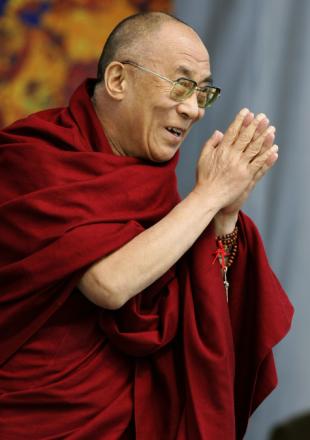Visit from a simple monk
By Kimberly Garza, The Daily Texan, Sept 20, 2005
Austin, Texas (USA) -- When the Dalai Lama stepped onto the stage of the Frank Erwin Center Tuesday afternoon, an estimated 12,000 people surged to their feet in deafening applause. But in an aisle amid the standing bodies, Ani Tsondru Tsomo dropped to her knees, lowering her forehead to touch the floor.
 Tsomo, 60, a native of Vietnam and a Buddhist all her life, traveled from her home in Houston to hear the man she calls "teacher" speak to the Austin community for the first time. She said despite her limited English skills, she understood what the Dalai Lama said.
Tsomo, 60, a native of Vietnam and a Buddhist all her life, traveled from her home in Houston to hear the man she calls "teacher" speak to the Austin community for the first time. She said despite her limited English skills, she understood what the Dalai Lama said.
"Language is not important - heart to heart, mind to mind," Tsomo said, placing a hand over her heart. "What he's feeling, I feel the same."
Tenzin Gyatso, the 14th reincarnation of the Dalai Lama, spoke to the crowd about his views on life, individual purpose and current global responsibilities. With the occasional help from an interpreter, the Dalai Lama emphasized the importance of "looking inward" to better understand one's own mind and emotions.
"If you think more inward, you will find more inner values," he said.
UT President Larry Faulkner introduced the religious leader, referring to him as "a catalyst for positive change who has always said that his true religion is kindness."
"He calls himself a simple monk from Tibet, but to millions of people around the world, he is a voice of hope, decency and wisdom," Faulkner said.
After the introduction, the religious leader took the stage but did not immediately launch into his lecture. Instead, he took a few moments to cup his hands over his eyes and peer into the crowd, eventually tucking his feet beneath him on his white sofa as he took a seat.
"I want to tell you that I'm nothing special," the Dalai Lama said. "We are same."
In his talk, titled "Individual Responsibility in the Global Community," the Dalai Lama emphasized his two commitments in life: the promotion of human value, and his efforts to bring about religious harmony. He said he was distressed by the recent conflicts between religions and hoped for closer relations in the future.
"All religions carry the same message: love," he said, adding through the interpreter that "religion can provide a source of hope and some kind of emotional anchor."
After slipping on a red visor to shield his eyes from the stage lights, he commented on a "sense of global responsibility," which he said was developing in issues such as economy and the environment.
"Now today, not only nation to nation, but continent to continent, we are heavily interdependent," he said. "The whole world is becoming one entity, one unity ... that's the new reality."
He discussed wars, calling them "part of the world" and emphasizing the necessity of world leaders to work through arguments by respecting others and listening to their views.
He said he thought people should try to think more about others. "I think, now times, [we should] look at the whole world," he said.
At the end of his lecture, the Dalai Lama answered seven questions sent in via e-mail. In answering, he said he believed that global tensions were due to a "lack of closer relations" between the countries, and that it is important to teach the younger generations how to solve conflicts through talking.
He mentioned that the day after the Sept. 11 terrorist attacks, he sent a letter to President Bush expressing his condolences and his belief that the "best way to solve is a nonviolent way."
When asked if he had a peaceful idea for settling America's conflict in Iraq, he said simply, "That is beyond my wisdom."
The current manifestation of the Bodhisattva of Compassion won the Nobel Peace Prize in 1989 for his philosophical writing and leadership on behalf of global peace.
The talk closed on a humorous note when one e-mail question asked the Dalai Lama what type of music he enjoyed. He laughed and said, through a translator, that he did not have much interest in music.
"[I think of music] like mosquitoes," he said, gesturing with his hands as the audience laughed. "A little irritation."
Throughout his talk, the Dalai Lama stressed the importance of inner peace and joy.
"We all have the right to a happy life. That's our goal," he said. "The very purpose of our life, I think, is happiness."
As she exited the Erwin Center, Tsomo said even though the speech was over, she would still be connected with the Dalai Lama through his power.
"Mind to mind will continue," she said. "And he is still in my heart."

 Tsomo, 60, a native of Vietnam and a Buddhist all her life, traveled from her home in Houston to hear the man she calls "teacher" speak to the Austin community for the first time. She said despite her limited English skills, she understood what the Dalai Lama said.
Tsomo, 60, a native of Vietnam and a Buddhist all her life, traveled from her home in Houston to hear the man she calls "teacher" speak to the Austin community for the first time. She said despite her limited English skills, she understood what the Dalai Lama said.